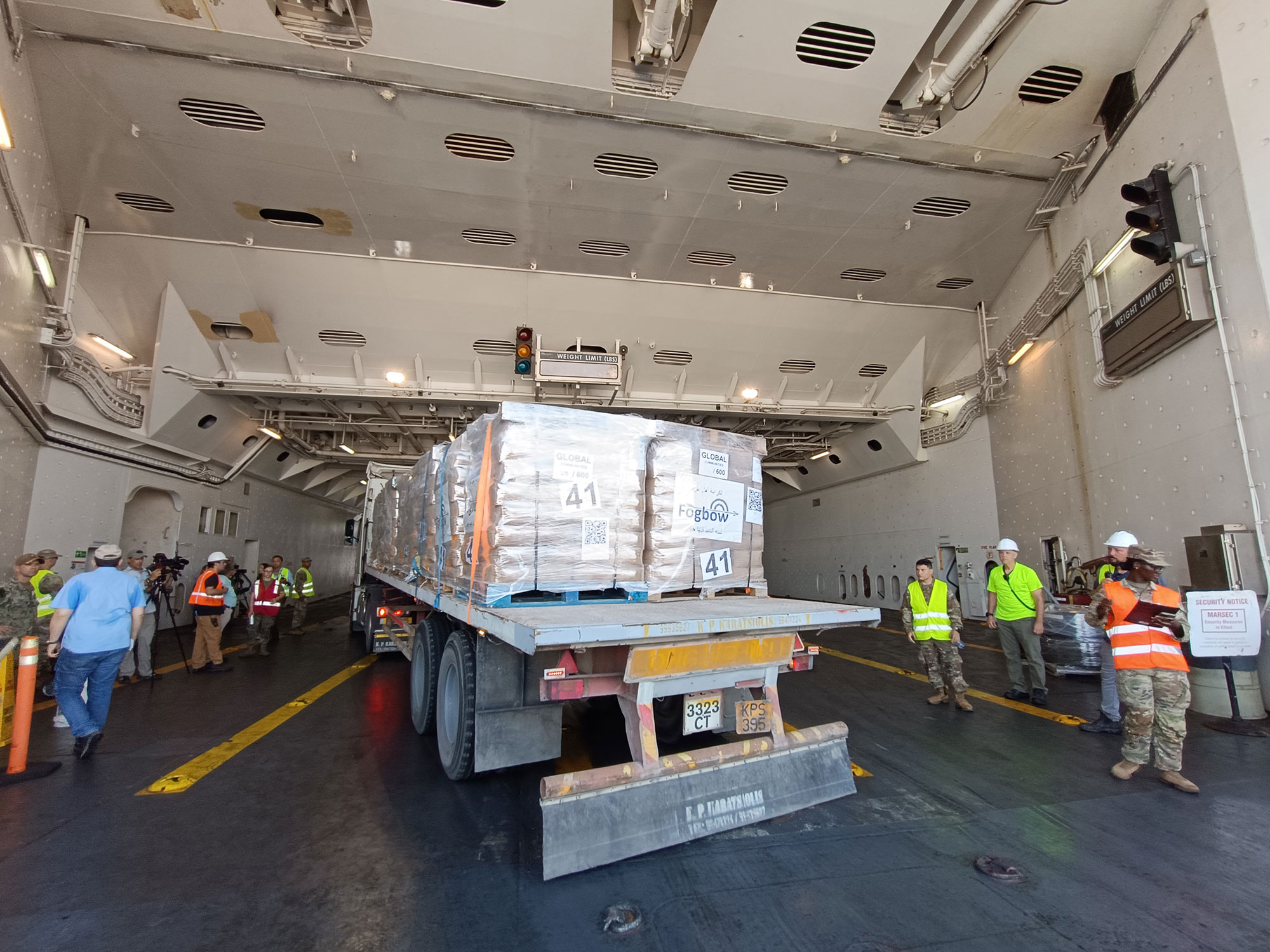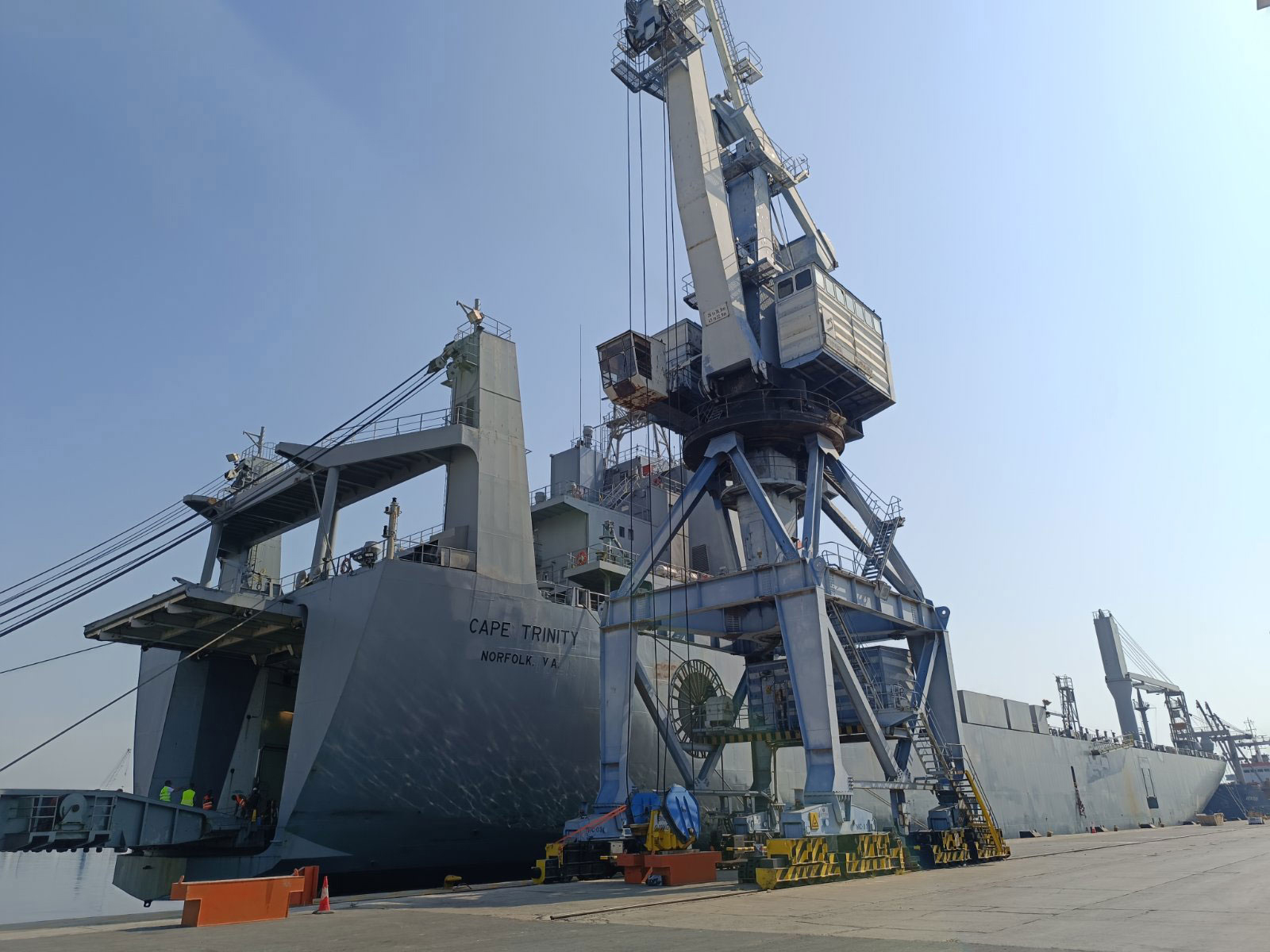A ship loaded with 2,000 pallets of humanitarian aid departed on Wednesday from Larnaca port to the US-built pier in Gaza, amid growing concerns for the project’s viability and a lawlessness on the ground which is hampering humanitarian efforts.
The US Cape Trinity vessel, spanning almost 200m long, will transfer flour, rice, canned and dry food as well as items such as tents to Palestinians in the besieged enclave.
Aid workers however raised the alarm that a “growing lawlessness” unfolding on the ground is preventing the distribution of aid.
Amid increasingly critical reports in the international press casting doubt over the viability of the aid project, journalists were given a tour at Larnaca port by United States Agency for International (USAID) officials, the US Department of Defence and Cyprus’ Civil Defence.
The purpose was to observe the Amalthea project unfold and be briefed on the situation in Gaza.
“I have never seen a more challenging and complex environment for the humanitarian community to work.” Doug Stropes, lead of operations with the USAID said.
So far, humanitarian agencies have lost 270 staff to the war, and it is paramount to create an environment where humanitarians can work “without being targeted, injured or killed”.

“This crisis continues to present daily challenges to Gaza. There’s fighting between Israel and Hamas, there is checkpoints and growing lawlessness in the area that prevents the safe distribution and transport of aid to the region,” he said.
As of June 25, almost 7,000 metric tons of humanitarian assistance has been delivered to Gaza through the humanitarian maritime corridor, he said. Of that, nearly 1,000 metric tonnes has been collected for further distribution by the UN, Stropes specified.
Currently, the biggest obstacle is the absence of a secure environment that can allow aid workers to distribute the assistance, he said. This involves the security environment around the Joint Logistics Over-the-Shore (JLOTS) pier itself.
“There is a security review ongoing about the challenges in the area and how they can ensure that the assistance is able to get to where is needed and not encountering the lawlessness, the gang activity, the ongoing war between the two parties or the desperate needs of people there to be able to try to get it where it needs to be in those warehouses,” he said.
Looting appears to have expanded beyond to distribution, stopping vehicles, trying to get the assistance out and appears to be organised, he explained.
While not a large-scale organisation, there are organised elements that are stopping and taking the commodities from the trucks, Stropes said.
“We hear from partners from some of the land crossings that the convoys have encountered violence in the sense that groups are armed, not hurt.”
Stropes emphasised that the humanitarian corridor is not replacing the land crossing nor will it ever be a substitute to the vitally needed land crossings that need to reopen.
He pointed out that “the security conditions across Gaza must be improved to help the people of Gaza.” Focus must be given for a peaceful resolution that can enable a secure environment “that allows the humanitarian commodities available now to be distributed and put in the hands and the mouths of those who need them at this moment”.
“The stacking up of these goods, most of these owned by the UN at this time, shows us that there is a willingness to address the humanitarian needs, and the UN is continuing to work around the clock to get this life saving assistance where it needs to go.”
To stem the awful humanitarian situation Gazans find themselves into, “we calculated they need a steady stream of 600 trucks per day to address the needs and return them out of humanitarian crisis situation.”
Stropes is the lead for operations, overseeing the operational aspects for USAID. He explained he served specifically the convoy management board, which is made up of government, Israeli IDF officials, US Department of Defence officials, and also the UN.
He referred to the “strong partnership” with the government of Cyprus and Israel, UN, international donors such as the UAE, the UK and EU and expressed appreciation to all and especially to Cyprus for “ensuring the safe and swift screening of commodities through the humanitarian corridor”.
Stropes said the operation will continue to take every opportunity while the weather conditions permit as regards the Jlots pier, “to deliver as much aid as we can into Gaza so that it is available and right where it needs to be”, noting he cannot give a timeframe when it will stop operations.
“It will continue to be there as long as weather conditions permit the corridor” which is vulnerable due to the waves as they shift the connectors.
His statements over the weather come at the heels of increasing doubts cast over the pier’s viability. Since it began operations on May 17, the pier has only been usable for 12 days, The Guardian wrote on June 23. Presuming the pier is used for the latest shipment, the number may go up by another day or two.
Operations had been suspended until last week while the US fixed the temporary pier in Gaza. The pier has so far cost $230 million and press reports detail that there is not enough aid getting to Gaza, it is not getting disbursed and the food may simply go bad.
Last week, the New York Times ran a piece with the headline ‘US Pier for Gaza Aid Is Failing, and Could Be Dismantled Early’ due to its vulnerability to the weather.
“This is not a good story for the Pentagon,” one aid representative told Politico. “This is something they’ve invested a lot of time and money into and it is not unfolding the way they thought it would.”
Panagiotis Liasides, assistant director and spokesperson of the Republic of Cyprus’ Civil Defence department, said that together with USAID services “we are running this logistical hub” where humanitarian assistance that is coming from other countries is collected “and we have to make the necessary arrangements for the shipment of this assistance for the people in need in Gaza”.
He thanked all partners and stakeholders who are supporting this initiative and for donations that Cyprus has from different countries and organisations.
Liasides said Amalthea is a maritime corridor which aims to deliver supplementary assistance to Gaza in line with the UN 2720 mechanism.
The pallets with commodities are loaded onto trucks which arrive at the port and undergo screening for security reasons. Currently there are two scanners stationed at Larnaca port. Once they are scanned and approved, they receive a check sign and enter the ships.
Aid that has not been loaded yet remains in secured stored storage by customs until the date of shipment.






Click here to change your cookie preferences